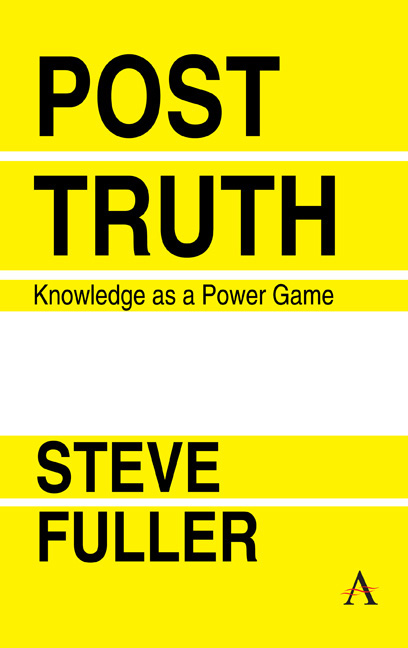Book contents
- Frontmatter
- Dedication
- Contents
- Acknowledgements
- Introduction: Science and Politics in a Post-Truth Era: Pareto's Hidden Hand
- 1 Brexit: Political Expertise Confronts the Will of the People
- 2 What Philosophy Does and Does Not Teach Us about the Post-Truth Condition
- 3 Sociology and Science and Technology Studies as Post-Truth Sciences
- 4 The Post-Truth about Academia: Undiscovered Public Knowledge
- 5 Science Customization: A Project for the Post-Truth Condition
- 6 The Performance of Politics and Science on the Playing Field of Time
- 7 Forecasting: The Future as the Post-Truth Playground
- The Argument in a Nutshell
- Glossary
- References
- Index
2 - What Philosophy Does and Does Not Teach Us about the Post-Truth Condition
Published online by Cambridge University Press: 14 July 2018
- Frontmatter
- Dedication
- Contents
- Acknowledgements
- Introduction: Science and Politics in a Post-Truth Era: Pareto's Hidden Hand
- 1 Brexit: Political Expertise Confronts the Will of the People
- 2 What Philosophy Does and Does Not Teach Us about the Post-Truth Condition
- 3 Sociology and Science and Technology Studies as Post-Truth Sciences
- 4 The Post-Truth about Academia: Undiscovered Public Knowledge
- 5 Science Customization: A Project for the Post-Truth Condition
- 6 The Performance of Politics and Science on the Playing Field of Time
- 7 Forecasting: The Future as the Post-Truth Playground
- The Argument in a Nutshell
- Glossary
- References
- Index
Summary
A Post-Truth History of Truth
Philosophers claim to be seekers of the truth, but the matter is not quite so straightforward. Another way to see philosophers is as the ultimate experts in a post-truth world. They see ‘truth’ for what it is: the name of a brand ever in need of a product which everyone is compelled to buy. This helps explain why philosophers are most confident appealing to ‘The Truth’ when they are trying to persuade non- philosophers, be they in courtrooms or classrooms. In more technical terms, ‘truth’ – and the concepts surrounding it – is ‘essentially contested’ (Gallie 1956). In other words, it is not simply that philosophers disagree on which propositions are ‘true’ or ‘false’ but more importantly they disagree on what it means to say that something is ‘true’ or ‘false’.
If you find my judgement too harsh or cynical, consider the careers of the key philosophical terms in which knowledge claims are transacted, not least ‘evidence’ and ‘truth’ itself. ‘Evidence’ is a good place to start because it feeds directly into the popular image of our post-truth world as ‘post- fact’, understood as a wilful denial of solid, if not incontrovertible, pieces of evidence, whose independent standing sets limits on what can be justifiably asserted about the world.
Yet it was only in the early modern period that philosophers even began to distinguish a purely fact- based conception of evidence from personal revelation and authoritative testimony. The break only became clean in the mid- nineteenth century when logic books regularly started to classify peoplebased claims to evidence among the ‘informal fallacies’, unless the people had direct acquaintance with the specific matter under dispute (Hamblin 1970). The concept of ‘expert’, a late nineteenth- century juridical innovation based on a contraction of the participle ‘experienced’, extended the idea of ‘direct acquaintance’ to include people with a specific training by virtue of which they are licensed to inductively generalize from their past experience to the matter under dispute. In this way, the recently proscribed ‘argument from authority’ made its return through the back door (Turner 2003).
This slow crafting of the concept of evidence was part of the general secularization of knowledge. At the same time, it would be a mistake to think that today's concept was purpose- made for scientific enquiry.
- Type
- Chapter
- Information
- Post-TruthKnowledge as a Power Game, pp. 25 - 52Publisher: Anthem PressPrint publication year: 2018

